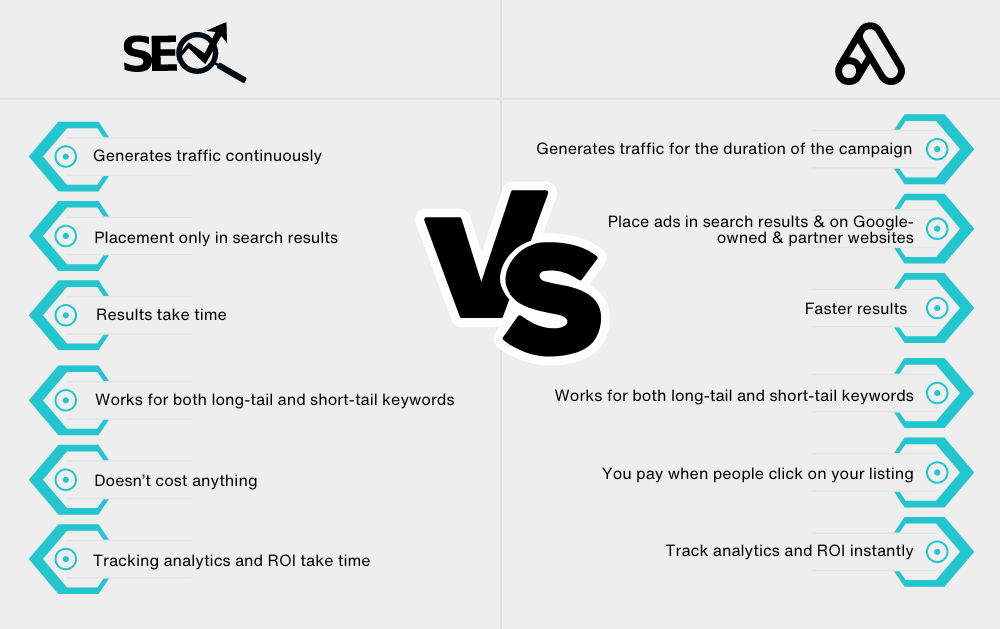How to Pick: SEO or Google Ads: Your No-Stress Guide to Smart Marketing
Feeling stuck between SEO or Google Ads. You are not alone. Many business owners wrestle with this very choice. They wonder where to put their hard-earned money and time. Should you plant a slow-growing oak tree that lasts for decades? Or should you plant quick-blooming flowers that need constant replanting?
Additionally, this guide cuts through the confusion. We will walk through this decision together, step by step. You will learn the core strengths of each approach. More importantly, you will discover a simple framework to pick the right one for your business right now. Let us find your best path forward.

Firstly, Let’s Understand the Players: SEO or Google Ads
Before we choose, we must understand what we are dealing with. Moreover, think of your website as a new store in a massive digital city. SEO and Google Ads are two different strategies to get customers through your door.
SEO (Search Engine Optimization)
is the long game. It involves optimizing your website and creating fantastic content. Your goal is to earn free, organic traffic from search engines like Google. Furthermore, consequently, you build authority and trust over time. Then, success in SEO means your site becomes a trusted landmark. People find you naturally, again and again.
Google Ads
It is the immediate play. It is a powerful advertising platform. You create ads and bid on keywords. Then, your ads appear at the very top of the search results, labeled “Sponsored.” Essentially, you pay for prime placement. You only pay when someone clicks on your ad. Therefore, you can drive targeted traffic to your site in a matter of hours.
The Core Differences: SEO or Google Ads: A Side-by-Side Look
Now, let us break down the key differences. This comparison will highlight the trade-offs.
1. Timing: The Tortoise and The Hare
SEO is a marathon. You will not see results overnight. First, you must research keywords. Then, you optimize your site’s technical structure. Next, you publish high-quality content. Finally, you build backlinks from other reputable sites. Then this entire process can take six months or more to show significant traffic. However, the results are incredibly durable.
Google Ads, conversely, is a sprint. You can set up a campaign and start receiving clicks today. Your ads can go live in under an hour. Then this speed is perfect for urgent promotions. For instance, you can launch a new product or clear out seasonal inventory. The traffic stops, however, the moment you stop paying.
2. Cost: Investment vs. Expense
SEO is an investment of time and resources. You might hire an SEO specialist or a content writer. Alternatively, you might invest your own time into learning and doing the work. Then there is no direct cost per click. Instead, you pay in effort and patience. Your investment compounds over time, building a valuable asset—your website’s organic visibility.
Google Ads is a direct marketing expense. You operate on a pay-per-click (PPC) model. You set a budget, and you pay for each visitor. Highly competitive keywords can be very expensive. Therefore, your traffic flow is directly tied to your daily budget. Then, it is a controllable cost, but it never builds owned equity.
3. Visibility and Trust: Earned vs. Bought
SEO builds incredible trust. Users often view organic results as more legitimate and unbiased. They see your site as an authority. Earning the top organic spot signals that Google trusts your content. Then this leads to higher brand credibility and often better conversion rates over the long term.
Google Ads provides guaranteed visibility. Your ads sit in the prime digital real estate at the top of the page. This is invaluable for immediate recognition. However, some users are wary of ads and may skip them intentionally. You are buying attention, not necessarily earning trust outright.
4. Targeting Precision: Broad Net vs. Laser Focus
SEO forces you to think broadly. You typically target informational keywords like “how to fix a leaky faucet” or commercial keywords like “best plumbing services.” You cast a wide net to attract people at various stages of their journey.
Google Ads allows for surgical targeting. You can show ads to people based on their location, device, time of day, and even specific life events. Then this is powerful for reaching a hyper-specific audience. For example, you can target only users in your city searching for “emergency plumber” on their mobile phone after 5 PM.
The Decision Matrix SEO or Google Ads: Which One is Right for YOU?
So, how do you pick? Ask yourself these four simple questions.
1. What is your timeline?
- Need sales this month? Firstly, choose Google Ads. It provides the immediate traffic you need to meet short-term goals.
- Building for next year? Secondly, choose SEO. Start building your organic foundation now for sustainable future growth.
2. What is your budget reality?
- Have upfront cash but less time? Firstly, choose Google Ads. Then, you can allocate a fixed monthly budget and see immediate data.
- Have more time than cash? Secondly, choose SEO. You can invest your own sweat equity into creating content and learning the basics, which has a lower financial barrier to entry.
3. What is your primary business goal?
- Launching a promotion or testing a new product? Firstly, choose Google Ads. You can quickly gauge market interest and drive immediate action.
- Building a brand and becoming an industry leader? Secondly, choose SEO. Consistent, high-quality content will establish your authority and build lasting customer relationships.
4. Is your market super competitive?
- In a crowded, competitive niche? You might need both. Use Google Ads to get immediate visibility while you patiently build your SEO fortress. Alternatively, use Google Ads to target less competitive, long-tail keywords that are cheaper and more specific.
The Winner’s Strategy SEO or Google Ads: Why Not Use Both?
Additionally, the most powerful approach is a combined one. Then think them as teammates, not rivals.
Use Google Ads for immediate results and to gather priceless data. See which keywords actually convert into customers. Then, use that data to inform your SEO strategy. Then, create deep, helpful content around those high-performing keywords.
For example, run a Google Ads campaign for “buy running shoes online.” Then, use your SEO efforts to create blog posts targeting “how to choose the right running shoes” or “best running shoes for flat feet.” Then, you capture customers at the moment of purchase and attract those earlier in their journey. Ultimately, this creates a complete marketing funnel.
Frequently Asked Questions (FAQ) with SEO or Google Ads
Q1: Can I just do SEO myself to save money?
Absolutely. Many businesses start with DIY SEO. You can learn the basics of keyword research, on-page optimization, and content creation. However, SEO requires consistent effort and can be technically complex. As your business grows, hiring a professional often becomes necessary to compete effectively.
Q2: I tried Google Ads, and it was expensive. Did I do it wrong?
Possibly. A poorly structured Google Ads campaign can waste money quickly. The key is precise keyword selection, compelling ad copy, and optimized landing pages. Then, consider consulting with a PPC specialist or using Google’s free training before giving up. A well-managed campaign should provide a positive return on investment.
Q3: Which one gives a better return on investment (ROI)?
This is the million-dollar question. SEO often delivers a higher long-term ROI because the traffic is free after the initial work. However, Google Ads can provide a faster, more measurable ROI for specific campaigns. Then the best ROI typically comes from using them together in a smart, coordinated strategy.
Q4: How long does it really take to see SEO results?
Do not expect miracles in the first few months. Typically, it takes about 4 to 6 months of consistent, quality work to see meaningful traction. For highly competitive industries, then, it can take a year or more to rank for top terms. Then, patience and persistence are your greatest assets in SEO.
Q5: Is it true that Google Ads helps your SEO rankings?
No, not directly. Google explicitly states that paid ads do not influence organic rankings. However, running Ads can indirectly help your SEO. Then, you gain valuable keyword conversion data. Furthermore, brand searches for your company name may increase, which is a positive organic ranking signal.
Conclusion SEO or Google Ads: Your Next Step is Clear
The choice between SEO and Google Ads is not a permanent life sentence. It is a strategic decision based on your current resources and goals.
If you need results now and have the budget, start with Google Ads. Get that immediate traffic and sales data.
If you are building for the future and want to create a lasting asset, start with SEO today. Plant your oak tree.
And if you want to dominate your market, build a strategy that uses both. Let your Google Ads fund your growth today while your SEO efforts build the foundation for your success tomorrow.
Your audience is searching. Now you know how to answer their call.
